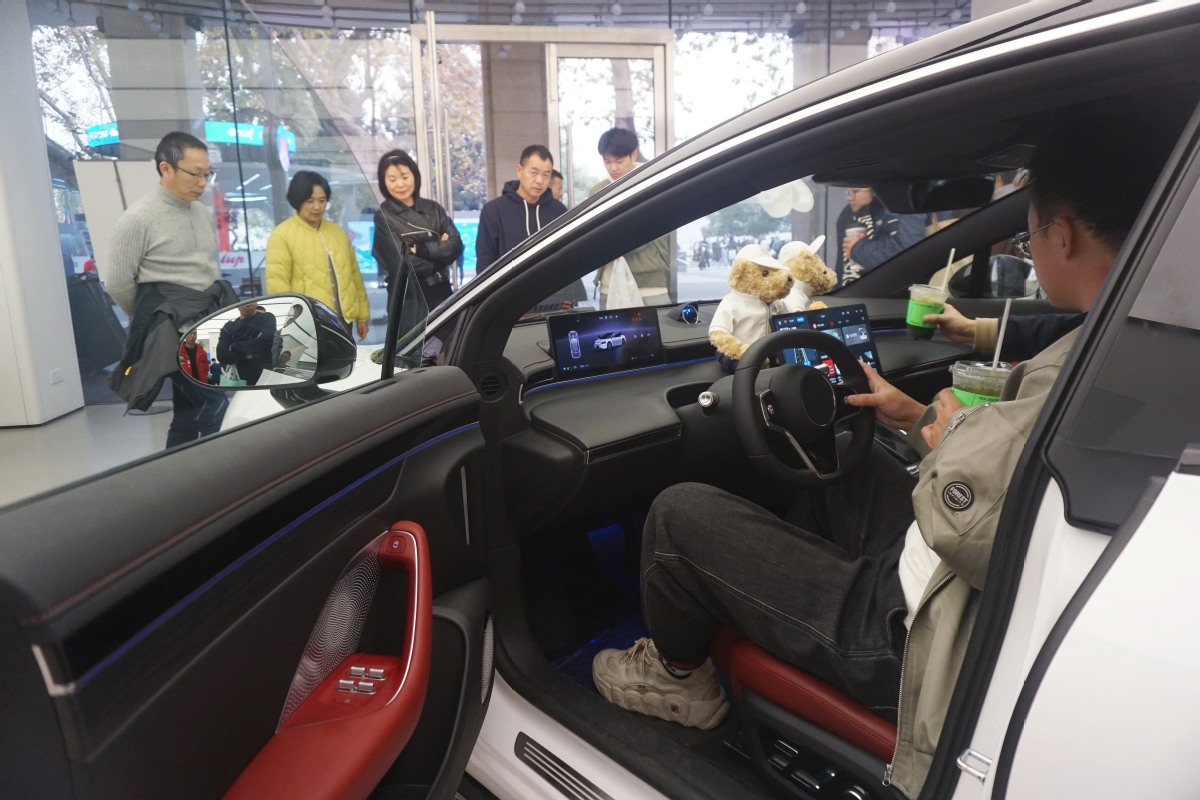Tech firms eye big footprint in vrooming NEV sector
Efficient supply chain, talent and rising demand attracting more players
By MA SI | China Daily | Updated: 2024-05-03 08:24

"Huawei's intelligent driving service is available now, not in the future," Yu said.
Its advanced intelligent driving system, which Huawei calls "navigation-based connected autonomous driving for urban areas", has received a full-scale upgrade, with immediate delivery upon purchase.
The function covers over 40,000 urban and rural areas nationwide, offering seamless driving experiences wherever there are roads, and improving with every mile driven.
With industry-leading parking capabilities, it enables intelligent parking scenarios such as valet parking, remote parking and maneuvering in narrow and mechanical parking spaces, Huawei added.
Chery said it has established an independent business unit for its cooperation with Huawei, backed by dedicated manufacturing facilities and resources.
Huawei's technology and standards empower intelligent manufacturing processes, ensuring that each S7 undergoes nearly 10,000 quality inspections before leaving the factory.
Donghai Securities said in a research note that autonomous driving technologies are entering a phase of rapid growth in China, as tech companies such as Huawei bring in more advanced driving assistance systems to cars.
Cui Dongshu, secretary-general of the China Passenger Car Association, said there is enough room for the development of smart cars in the 5G era. Huawei can offer a slew of technological solutions and services covering both hardware and software.
Similar to Huawei's emphasis on smart driving, Xiaomi also sees "intelligence as the soul of automobiles".
Lei Jun, chairman and CEO of Xiaomi, said: "In terms of intelligent electric cars, the issue of electrification has already been addressed over the past decade, and the next decade will be characterized by intelligence. Intelligence will become the decisive factor of this era."
According to him, Xiaomi has made significant investments in intelligent driving, with its dedicated research and development team currently exceeding 1,000 people and expected to surpass 1,500 by the end of the year. The company's test vehicles have accumulated road test mileage exceeding 10 million kilometers for intelligent driving.
The company's much-anticipated first electric vehicle SU7, unveiled in March, was well received by consumers, reaffirming Xiaomi's ambition to build cars comparable to those of global automakers Porsche and Tesla and to become one of the top five auto manufacturers in the world in the future, Lei said.
According to him, Xiaomi, as a technology company and one of the top three global smartphone companies, has key advantages in intelligent technology. Xiaomi has strong capabilities in consumer electronics, operating systems, chips, AI, and other areas, significantly outpacing traditional automakers. It will be very difficult for traditional automakers to catch up with Xiaomi, he added.
Roy Lu, a Shanghai-based automotive analyst, said Xiaomi's entry is expected to intensify competition in China's NEV market where established automakers, startups and tech companies are all vying to expand their presence.
A price war is already underway in China's EV market, which is the world's largest.
Xiaomi's edge lies in its AI-enabled internet of things, or IoT, ecosystem, which might give it an upper hand amid competition, Lu said.
The Beijing-based company hopes that the SU7's shared operating system with its phones, laptops and other devices will appeal to existing customers.
Lei said Xiaomi plans to invest 24 billion yuan in R&D this year, demonstrating a serious commitment to manufacturing cars.
The Xiaomi SU7 underwent comprehensive testing in 300 cities, covering a total road distance of 5.4 million kilometers, with 576 test vehicles deployed.
Lei said that over the past three years of manufacturing cars, his biggest realization was just how difficult it is, noting that even large companies like Apple Inc have given up on it.
Zhang Yongwei, vice-president and secretary-general of China EV 100, a major auto industry think tank, said the competition in the EV industry will heat up this year, with a more differentiated market landscape.
The next one or two years will be very crucial, Zhang said, as companies that may not have the necessary competence will likely exit the market after a shakeout.
"The production volume and sales of new energy vehicles in China are expected to reach 13 million units in 2024, with a year-on-year growth rate of about 40 percent," Zhang said.
Chinese tech companies' rapid involvement in the car industry also banks on the country's efficient and sound auto supply chain.
Wang Jun, president of Changan Auto, said China has explored a successful path for the global NEV industry, with mature technologies and comprehensive industrial chains. "China has cultivated numerous high-quality component enterprises, including over 1,000 battery companies, and over 350 electric control companies."
Such a sound industrial foundation makes it easier for tech companies to make cars themselves, but it remains to be seen whether or not they can really afford the capital and time needed for the cash-intensive smart car business, given that several Chinese companies that had entered the segment faced severe financial difficulties. Some of them have even gone bankrupt, experts added.
masi@chinadaily.com.cn
























